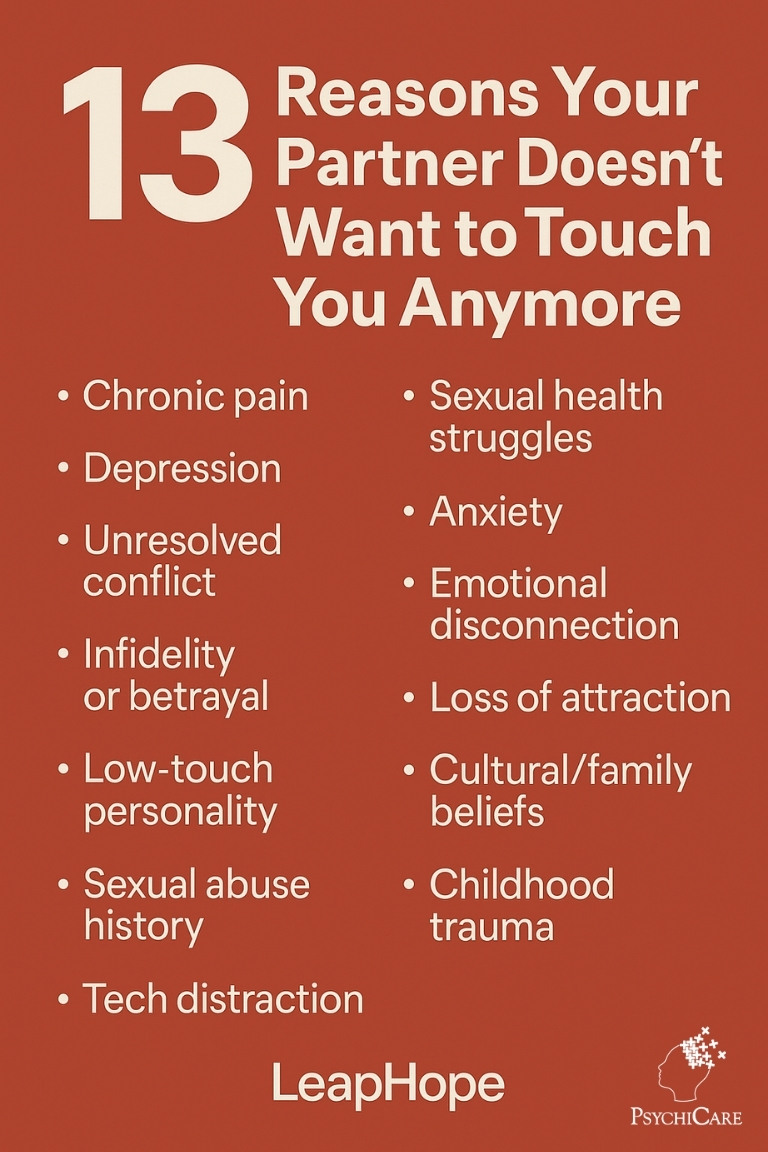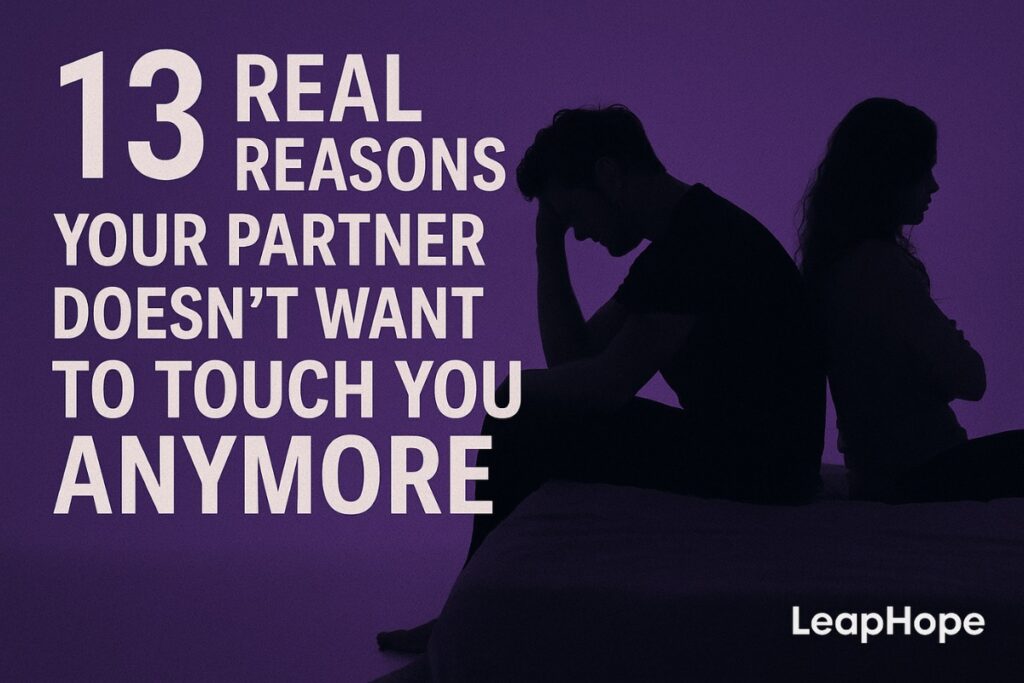Reviewed by Sanford M, Relationship and Sex Health Counsellor
You reach out to hold their hand, lean in for a hug, or sit close on the couch, and they pull away, act distracted, or freeze up. The silence is louder than ever. If you’ve found yourself wondering, “Why doesn’t my partner touch me anymore?”, you’re not alone.
Physical affection is often one of the first things to fade when something deeper is going on. It doesn’t always mean the relationship is broken, but it is a signal you shouldn’t ignore.
As a licensed sexologist, I’ve worked with many individuals and couples facing this exact struggle. Sometimes the reason is obvious, like stress or conflict.
Other times, it’s buried beneath shame, trauma, emotional disconnection, and even betrayal. In this article, we’ll unpack 13 real, human reasons your partner may be withdrawing from physical touch and what you can do about it.
1. Health Issues Can Make Your Partner Avoid Physical Touch
Physical health isn’t just about the body; it deeply affects how we experience closeness, comfort, and sexual desire. If your partner is suddenly distant, a health-related reason might be at play.
Chronic Pain or Fatigue
- Conditions like arthritis, fibromyalgia, endometriosis, or migraines can make even gentle touch feel painful or irritating.
- Persistent fatigue (from anemia, thyroid issues, or post-viral recovery) reduces interest in cuddling or sex.
Sexual Health Struggles
- Erectile dysfunction (ED) in men or vaginal dryness or pain during intercourse in women can cause embarrassment or performance anxiety.
- These issues often lead to silent withdrawal from physical intimacy, rather than open conversation.
Hormonal Imbalances
- Menopause, low testosterone, or polycystic ovary syndrome (PCOS) can cause a drop in sex drive.
- Hormonal contraceptives or postpartum shifts can also affect physical sensitivity and desire.
Medication Side Effects
- Many prescription drugs, especially antidepressants (SSRIs), blood pressure meds, birth control, and anti-anxiety medications can lower libido or reduce physical sensitivity.
2. Mental Health Issues That Impact Physical Touch
Your partner’s silence or withdrawal may have nothing to do with how they feel about but everything to do with what’s going on inside their mind. Mental health struggles can seriously reduce a person’s ability or desire to engage in physical closeness.
Depression
- A common symptom of depression is withdrawal emotionally and physically.
- Your partner may feel numb, heavy, or undeserving of love, making physical affection feel overwhelming or pointless.
Anxiety
- Anxiety can cause overstimulation, irritability, or a need for space.
- For some, even the idea of touch feels like added pressure or triggers panic, especially when they’re already mentally overwhelmed.
Stress and Burnout
- Chronic stress from work, parenting, or life pressure often pushes physical intimacy to the back burner.
- When the nervous system is stuck in “survival mode,” cuddling or touching just isn’t a priority.
Fear of Intimacy
- Some people, even in long-term relationships, carry unresolved fears about closeness.
- This may stem from past rejection, abandonment, or attachment trauma and it shows up as pulling away from touch when things feel too close.

3. Relationship Problems That Kill Physical Intimacy
Even when two people love each other, unresolved relationship issues can quietly erode physical closeness. When affection starts to disappear, it often reflects something deeper going wrong between you.
Unresolved Conflict
- Lingering arguments, passive aggression, or unsaid resentment can make your partner pull back from touch.
- When emotional wounds are left unspoken, physical intimacy becomes awkward or even unwelcome.
Emotional Disconnection
- If deep conversations, laughter, or shared goals have faded, physical connection usually follows.
- Your partner might not feel close, so they stop reaching out, even for a hug.
Loss of Attraction
- This doesn’t always mean your partner doesn’t love you but emotional distance, hygiene issues, lifestyle changes, or poor communication can affect desire.
Boredom or Routine
- Many couples fall into autopilot same day, same schedule, no excitement.
- Without effort to keep things fresh, physical intimacy becomes a task, not a desire.
Poor Communication About Needs
- If one or both partners never voice what they enjoy or miss, physical intimacy can stall.
- Feeling rejected or misunderstood often leads to silent shutdowns.
4. Signs of Betrayal or Emotional Distance That Affect Touch
When something feels “off” in your relationship and physical touch suddenly stops, emotional betrayal or broken trust could be the hidden reason. It doesn’t always mean infidelity; sometimes, the betrayal is subtle, emotional, or unspoken.
Infidelity or Emotional Affairs
- If your partner is emotionally or physically involved with someone else, they may start avoiding touch at home.
- Guilt, secrecy, or distraction with another person can make your connection feel cold and distant.
Discovering Something That Shattered Trust
- You may have uncovered flirty messages, inappropriate workplace behavior, or something from their past that hurt you deeply.
- Even if your partner didn’t physically cheat, emotional betrayal can create a huge wall between you and touch becomes awkward or painful.
Hiding Secrets or Living a Double Life
- Financial secrets, substance use, or online behavior (like porn addiction or secret chats) can erode closeness and intimacy.
Emotional Shutdown After Conflict
- Some partners don’t know how to repair emotional damage so they shut down entirely.
- This often shows up as complete avoidance of physical touch and emotional connection.
5. Personality Differences & Touch Preferences
Not everyone experiences physical affection the same way. Sometimes, your partner’s lack of touch isn’t about stress or conflict, it’s simply a reflection of how they’re wired.
Low-Touch Personality
- Some people just aren’t naturally affectionate.
- They may love deeply but show it in different ways through actions, words, or quality time instead of touch.
Different Love Languages
- If your love language is physical touch but your partner’s is acts of service or words of affirmation, you might feel neglected even if they think they’re showing love.
- This mismatch can leave both partners feeling unappreciated.
Cultural or Family Background
- If your partner grew up in an emotionally distant or non-touchy household, they may feel awkward or unfamiliar with consistent physical affection.
Neurodivergence or Sensory Sensitivity
- People with ADHD, autism spectrum traits, or sensory processing issues may feel overwhelmed by certain types of touch, especially during stress.
- It’s not rejection, it’s sensory regulation.

6. Past Trauma or Abuse That Makes Touch Feel Unsafe
Sometimes, the reason your partner avoids physical touch isn’t in the present at all, it’s in the past. Traumatic experiences can shape how someone relates to closeness, intimacy, and their own body.
History of Sexual Abuse or Assault
- Survivors of sexual trauma may struggle with physical touch, especially during vulnerable moments like cuddling or sex.
- Even years later, certain touches can trigger fear, shame, or flashbacks.
Physical or Emotional Abuse in Childhood
- If your partner grew up in an unsafe home where affection was absent or conditional, they may have learned to associate touch with danger or manipulation.
Religious or Cultural Shame Around Sex
- In some cultures or upbringings, touch and sex are loaded with guilt or taboo.
- Your partner may feel conflicted, dirty, or wrong for wanting physical closeness even in a committed relationship.
Medical Trauma or Body Image Issues
- Experiences like invasive surgeries, body shame, or critical partners can make people pull away from being touched or seen.

7. When Technology or Distraction Replaces Intimacy
It might sound surprising, but in today’s world, many couples lose physical intimacy not because of conflict but because of constant distraction. The body is there, but the mind is somewhere else.
Phone or Screen Addiction
- Endless scrolling, work emails, or binge-watching shows in bed often replace pillow talk, cuddling, or sex.
- Over time, screens take priority over physical closeness.
Overworking or Hustle Culture
- A partner who’s constantly “on the grind” might not feel emotionally or physically available.
- Even if they love you, they’re too mentally exhausted for touch or connection.
Parenting Overload
- Kids need so especially in the early years that couples often neglect each other’s physical needs.
- You might become co-parents or teammates, not lovers.
Emotional Affairs Online
- Emotional investment in someone on social media or gaming platforms can drain energy from the relationship even if no physical cheating happens.
Final Thoughts
A lack of physical touch in a relationship can feel heartbreaking, like the invisible thread between you is slowly unraveling. But often, this distance has less to do with how much your partner loves you and more to do with what they’re struggling to express.
From health challenges and mental burnout to betrayal or fear of intimacy, there are many reasons touch fades. The key is not to assume or stay silent. When you open up the conversation with care and curiosity, healing becomes possible.
You don’t have to accept emotional and physical distance as your new normal. Understanding the “why” is the first step to reconnecting in a way that feels safe, loving, and real.
When questions about intimacy don’t settle on their own
If concerns around desire, touch, or emotional closeness continue to cause distress, working with a licensed sex therapist can help clarify what’s happening and what to do next.
→ Online sex therapy with a licensed female sex therapist
FAQs
Why would someone avoid touch but still care deeply?
When someone avoids touch but still cares, it usually means physical closeness has started to feel emotionally heavy, overwhelming, or unsafe for them. This often comes from stress, unresolved tension, or inner struggles rather than a loss of love or attachment.
Can stress or burnout really affect physical affection?
When someone is under constant stress or burnout, their body stays in survival mode. In that state, touch can feel like extra effort instead of comfort, even when the relationship itself still feels important.
Is it normal for partners to have different needs for touch?
It’s very normal. Some people feel connected through physical closeness, while others connect more through conversation, shared time, or actions. Problems usually arise when these differences aren’t acknowledged or talked about openly.
Can someone avoid touch because they fear it will lead to sex?
When touch begins to feel like it automatically leads to sex, pressure can build. To avoid that pressure, a partner may pull away from all physical closeness, even if they still want emotional connection.
How can I talk about fading touch without pushing my partner away?
It helps to talk about comfort rather than blame. Sharing what you miss and asking how touch feels for them now keeps the conversation safer than asking why they’ve changed or what they’re doing wrong.
Can physical closeness return once it has faded?
In many cases, yes. When stress reduces, emotional safety improves, and pressure is removed, touch often returns gradually. Rebuilding closeness usually starts with small, low-pressure moments rather than big changes.




